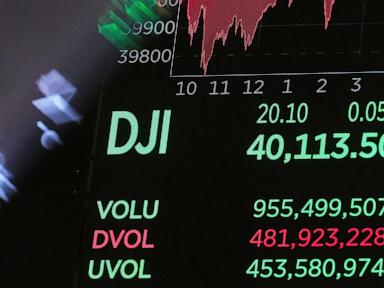Now Reading: Global shares mostly gain as uncertainty over US tariffs persists
-
01
Global shares mostly gain as uncertainty over US tariffs persists
Global shares mostly gain as uncertainty over US tariffs persists

In Hong Kong, global markets showed mostly positive trends on Monday as investors closely monitored negotiations concerning U.S. President Donald Trump’s tariffs. The S&P 500 futures decreased by 0.3% and the Dow Jones Industrial Average futures slipped by 0.2%. Meanwhile, Germany’s DAX rose by 0.2% to 22,294.34, the CAC 40 in Paris increased by 0.4% to 7,568.75, and Britain’s FTSE 100 advanced by 0.3% to 8,436.78.
Despite Beijing’s efforts to stimulate the economy, Chinese shares dropped as the status of trade talks between Washington and Beijing remained uncertain. President Trump stated ongoing negotiations with China on tariffs, while the Chinese government and U.S. Treasury Secretary Scott Bessent mentioned that talks had not yet commenced. The Hang Seng in Hong Kong remained nearly unchanged at 21,971.96, and the Shanghai Composite Index fell by 0.2% to 3,288.41. In Tokyo, the Nikkei 225 increased by 0.4% to 35,839.99, and South Korea’s Kospi remained stable at 2,548.86.
On Wall Street last Friday, Big Tech stocks contributed to a positive end to a volatile week, where markets swung due to concerns over Trump’s trade policies. The S&P 500 closed with a 0.7% increase, nearing its earlier record by 10.1%. The Nasdaq composite surged by 1.3%, led by gains in influential tech stocks like Nvidia, while the Dow Jones Industrial Average increased modestly by 0.1%. Google’s parent company, Alphabet, saw a 1.7% climb after reporting a 50% profit increase in 2025 compared to the previous year. Nvidia’s 4.3% rise also boosted the S&P 500 index, offsetting Intel’s 6.7% decline.
Despite last week’s market rally, concerns remain regarding Trump’s trade policies and the impact of tariffs on various industries. The hope is that a potential rollback of tariffs by Trump could prevent a looming recession. However, the uncertainty surrounding tariffs has led many companies to hesitate in providing financial forecasts for the upcoming year. The rapid changes in trade conditions due to on-again-off-again tariffs have caused households and businesses to adjust their spending and long-term investment plans.
In early Monday trading, U.S. benchmark crude oil dropped by 2 cents to $63.00 per barrel on the New York Mercantile Exchange. The international standard, Brent crude, decreased by 8 cents to $65.72 per barrel. The U.S. dollar fell slightly to 143.59 Japanese yen from 143.60 yen, and the euro declined to $1.1353 from $1.1366.






